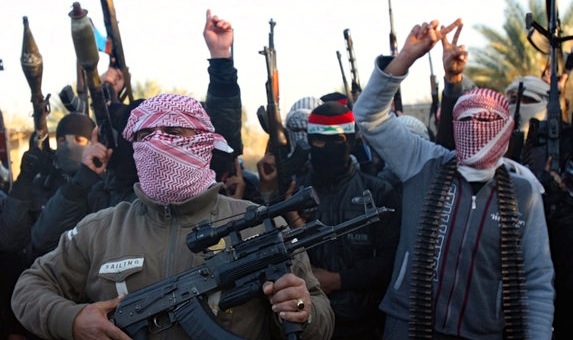
A Rock and a Hard Place

When President Obama addressed the nation about his plan of action to deal with the terrorist group ISIS (the Islamic State of Iraq and Syria), the most important part of his speech came at the beginning, according to global studies scholar Mark Juergensmeyer.
“What most people heard was, ‘We’re going to send in more troops and put together a military coalition,’ ” said Juergensmeyer, director of UC Santa Barbara’s Orfalea Center for Global and International Studies. “The important part of the speech came first, when he talked about the need for a new government in Iraq and called on the Iraqis to essentially fight this on their own. This has been Obama’s position all along.”
According to Juergensmeyer, who is also a professor of sociology and a renowned scholar of global religion, forming a coalition of partners that includes Muslim countries such as Jordan, Turkey, Saudi Arabia and Qatar is key to creating stability in the region and to address the threat of ISIS.
“Obama wants to get Jordan and Turkey and Saudi Arabia and Qatar directly involved in taking responsibility for this,” Juergensmeyer said. “It’s important for a variety of reasons, not the least of which is because he doesn’t want to continue America’s role of being the sole policeman in the world. This is a regional problem and the solution ultimately has to be a local and regional one.”
However, he continued, the U.S. helped to create the instability and has a responsibility to participate in finding that solution. “This is, in the case of Iraq anyway, a direct result of the instability we created by bringing down Saddam Hussein, admittedly a dictator, but the leader of an authoritarian government that held Iraq together as a nation,” Juergensmeyer said. “Following that, the U.S. was unable to successfully put together an enduring coalition of interests within the country, and allowed one sectarian group led by Nouri Al-Maliki to rule in favor of one group — the Shia — over another — the Sunnis.”
In Syria the situation is more complicated, he noted, because support for Syrian leader Bashar al-Asaad over the years by the U.S., as well as by Russia, has created a situation in which Sunnis feel they have no voice. “Without the support of the moderate Sunni leadership in both Syria and Iraq, these wild renegade forces of ISIS would have no support whatsoever,” Juergensmeyer said.
“That’s a long way of saying that ultimately the solution has to be the region taking charge of their own area,” he continued. “But because a part of that is the political situation that is supported by outside powers — and by that I mean not only the U.S. in the case of Iraq and Russia and Iran in the case of Syria and Iran also in the case of Iraq — all those players have to be involved in the solution.”
Juergensmeyer described ISIS as “an opportunistic infection” that finds fertile soil among the oppressed majority in parts of Iraq and Syria. “Sunnis in Iraq are not a majority, but in the Al Anbar region and the regions that ISIS has moved into, they are a majority and they feel like they have no voice,” he said. “And the same is true in Syria. In the eastern regions where ISIS is strong, you have people who feel oppressed.
“The Sunnis in Al Anbar province and in Syria — and I’ve talked to a lot of them — are great people. They just want to live their lives like everyone else,” Juergensmeyer continued. “They’re extremely frustrated by this situation in which they feel they’ve been kept out of public life. And along comes this group that gives them a position of power and lets them rule, and they’re happy to take it.”
Juergensmeyer noted that precedence exists to support Obama’s plan of adding 475 new troops to the roughly 1,000 already in place in Iraq. He cited the 2007 surge that increased the number of American troops in Baghdad but decreased forces in Al Anbar province — from Fallujah, Ramadi and areas west of Baghdad that were heavily populated by Sunnis.
“The strategy was to use American forces to police the city of Baghdad and keep down sectarian violence, and to use money to support the Sunni leaders — provide funds and military weapons so they could fight the extremists of al Qaeda and Iraq, the very people they had supported,” Juergensmeyer explained. “They were the predecessors of ISIS. And it worked. It turned things around in a matter of months.”
It happened before, he said, and it can happen again. “When Iraq initially asked for support, Obama told them to get their act together and change their government because they’re causing the problem. Supporting the Shia government against the Sunnis is what created the problem in the first place,” said Juergensmeyer. “A lot of hope is resting on this new government in Iraq, and I hope that hope is warranted.”



